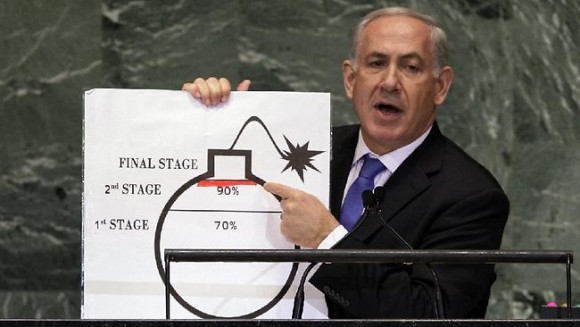
In the coming weeks and months, Israeli Prime Minister Benjamin Netanyahu is likely to “dedicate himself to derailing any prospect for a diplomatic breakthrough” between the United States and Iran. And the reasons have nothing at all to do with Iran’s nuclear program.
Instead, Israeli intransigence on the Iran issue is motivated by two factors: (1) maintaining regional military superiority and hegemony, and (2) distracting from the Israeli-Palestinian issue.
I mentioned this briefly in a post yesterday, but Daniel Levy, director of the Middle East and North Africa program at the European Council on Foreign Relations and a senior research fellow at the New America Foundation, devotes an entire piece in Foreign Policy to this very point. Here is the must-read excerpt:
At the moment, however, Netanyahu is signaling that there is no realistic deal that would be acceptable to Israel. For instance, a consensus exists among experts and Western officials that Iran’s right to enrich uranium — in a limited manner and under international supervision — for its civilian nuclear energy program will be a necessary part of any agreement. Netanyahu rejects this.
If Iran is willing to cut a deal that effectively provides a guarantee against a weaponization of its nuclear program, and that deal is acceptable to the president of the United States of America, why would Netanyahu not take yes for an answer?
The reason lies in Netanyahu’s broader view of Israel’s place in the region: The Israeli premier simply does not want an Islamic Republic of Iran that is a relatively independent and powerful actor. Israel has gotten used to a degree of regional hegemony and freedom of action — notably military action — that is almost unparalleled globally, especially for what is, after all, a rather small power. Israelis are understandably reluctant to give up any of that.
Israel’s leadership seeks to maintain the convenient reality of a neighboring region populated by only two types of regimes. The first type is regimes with a degree of dependence on the United States, which necessitates severe limitations on challenging Israel (including diplomatically). The second type is regimes that are considered beyond the pale by the United States and as many other global actors as possible, and therefore unable to do serious damage to Israeli interests.
…There are other reasons for Netanyahu to oppose any developments that would allow Iran to break free of its isolation and win acceptance as an important regional actor with which the West engages. The current standoff is an extremely useful way of distracting attention from the Palestinian issue, and a diplomatic breakthrough with Iran would likely shine more of a spotlight on Israel’s own nuclear weapons capacity. But the key point to understand in interpreting Netanyahu’s policy is this: While Obama has put aside changing the nature of the Islamic Republic’s political system, Israel’s leader is all about a commitment to regime change — or failing that, regime isolation — in Tehran. And he will pursue that goal even at the expense of a workable deal on the nuclear file.
The myth that Israeli, and by extension American, rhetoric against Iran is centered on an alleged threat of nuclear weapons proliferation and even use ought to be put to rest once and for all. That is merely a public sales campaign to drum up enough fear and hatred of Iran so that the above-mentioned strategic interests can be realized.
The only question that remains is whether President Obama has the cajones to stand up to Bibi and deliver a sensible deal with Iran over Israel’s objections.





